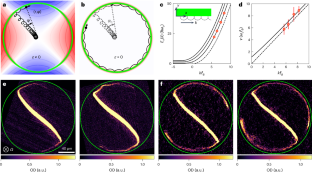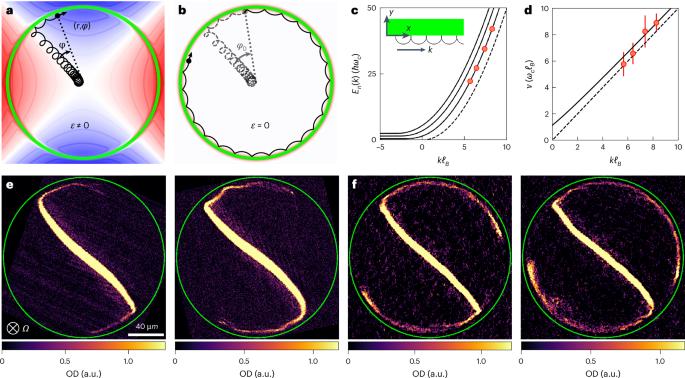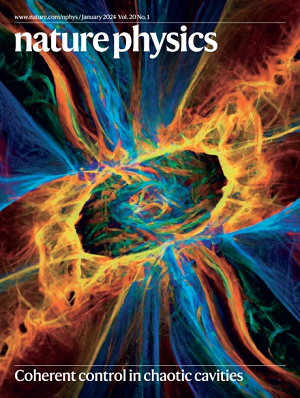Observation of chiral edge transport in a rapidly rotating quantum gas
IF 17.6
1区 物理与天体物理
Q1 PHYSICS, MULTIDISCIPLINARY
引用次数: 0
Abstract
The frictionless directional propagation of particles at the boundary of topological materials is a striking transport phenomenon. These chiral edge modes lie at the heart of the integer and fractional quantum Hall effects, and their robustness against noise and disorder reflects the quantization of Hall conductivity in these systems. Despite their importance, the controllable injection of edge modes, and direct imaging of their propagation, structure and dynamics, remains challenging. Here we demonstrate the distillation of chiral edge modes in a rapidly rotating bosonic superfluid confined by an optical boundary. By tuning the wall sharpness, we reveal the smooth crossover between soft wall behaviour in which the propagation speed is proportional to wall steepness and the hard wall regime that exhibits chiral free particles. From the skipping motion of atoms along the boundary we infer the energy gap between the ground and first excited edge bands, and reveal its evolution from the bulk Landau level splitting for a soft boundary to the hard wall limit. Finally, we demonstrate the robustness of edge propagation against disorder by projecting an optical obstacle that is static in the rotating frame. Edge modes are a key feature of topological materials, but their propagation is difficult to directly observe in condensed matter systems. The controlled injection and propagation of chiral edge modes has now been shown in a rotating ultracold gas.


快速旋转量子气体中的手性边缘传输观测
粒子在拓扑材料边界的无摩擦定向传播是一种引人注目的传输现象。这些手性边缘模式是整数和分数量子霍尔效应的核心,它们对噪声和无序的稳健性反映了霍尔电导率在这些系统中的量子化。尽管它们非常重要,但边缘模的可控注入及其传播、结构和动态的直接成像仍然具有挑战性。在这里,我们展示了手性边缘模式在光学边界限制的快速旋转玻色超流体中的蒸馏。通过调整壁的陡度,我们揭示了软壁行为(传播速度与壁的陡度成正比)与硬壁机制(表现出手性自由粒子)之间的平滑交叉。我们从原子沿边界的跳跃运动中推断出基带和第一激发边带之间的能隙,并揭示了它从软边界的体兰道水平分裂到硬壁极限的演变过程。最后,我们通过投射一个在旋转框架中静止的光学障碍物,证明了边缘传播对无序的稳健性。
本文章由计算机程序翻译,如有差异,请以英文原文为准。
求助全文
约1分钟内获得全文
求助全文
来源期刊

Nature Physics
物理-物理:综合
CiteScore
30.40
自引率
2.00%
发文量
349
审稿时长
4-8 weeks
期刊介绍:
Nature Physics is dedicated to publishing top-tier original research in physics with a fair and rigorous review process. It provides high visibility and access to a broad readership, maintaining high standards in copy editing and production, ensuring rapid publication, and maintaining independence from academic societies and other vested interests.
The journal presents two main research paper formats: Letters and Articles. Alongside primary research, Nature Physics serves as a central source for valuable information within the physics community through Review Articles, News & Views, Research Highlights covering crucial developments across the physics literature, Commentaries, Book Reviews, and Correspondence.
 求助内容:
求助内容: 应助结果提醒方式:
应助结果提醒方式:


